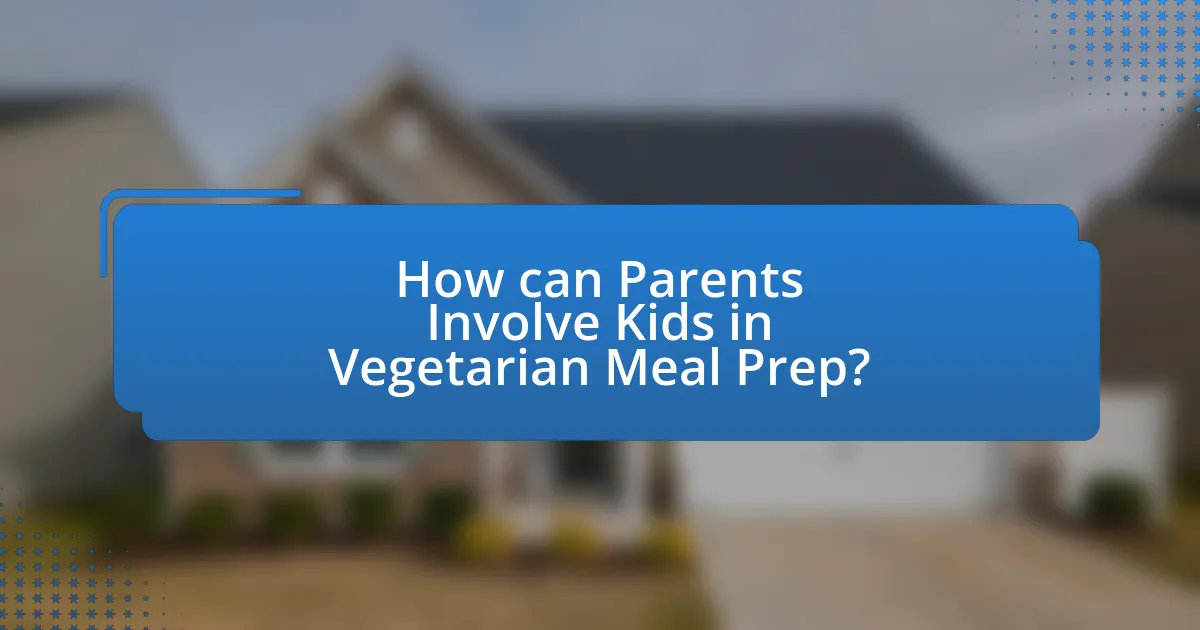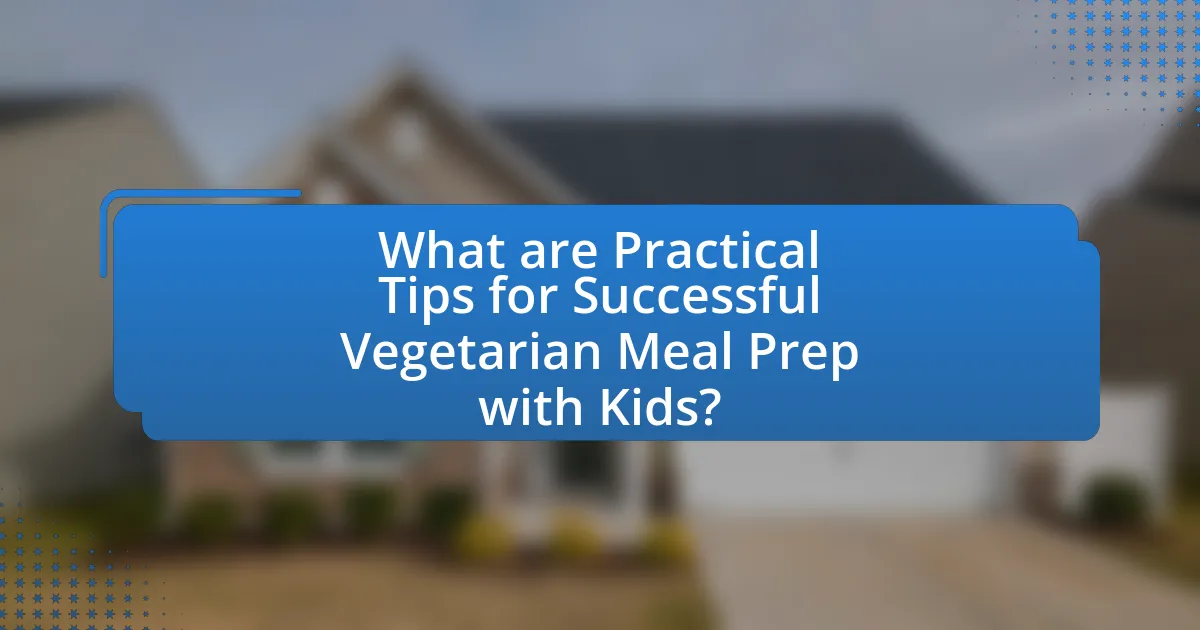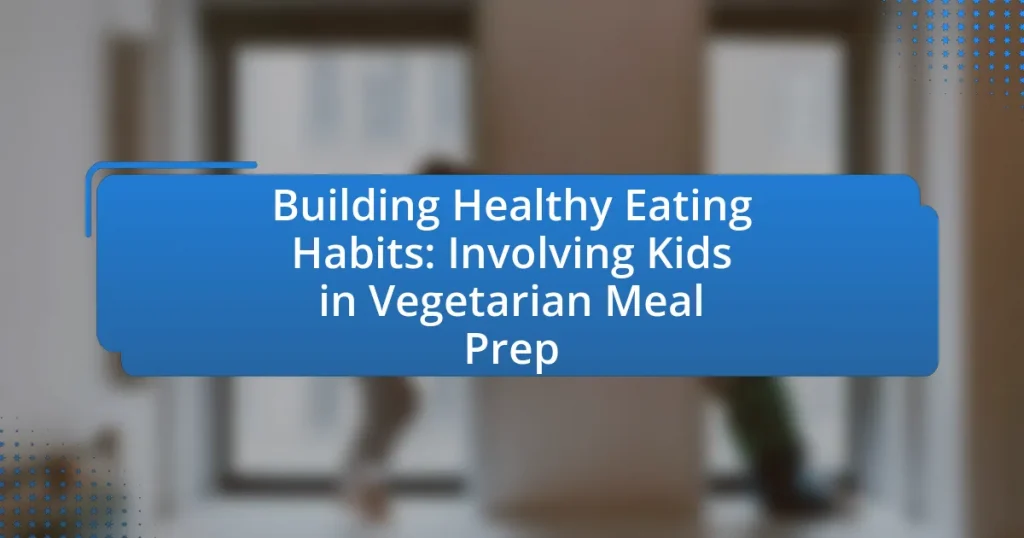The article focuses on building healthy eating habits in children through involvement in vegetarian meal preparation. It emphasizes the importance of a balanced diet rich in fruits, vegetables, whole grains, and lean proteins for children’s growth and development. Key points include the benefits of engaging kids in meal prep, which enhances their willingness to try new foods and fosters positive attitudes towards healthy eating. The article also outlines practical strategies for parents to involve their children in cooking, highlights the nutritional benefits of a vegetarian diet, and provides easy vegetarian recipes suitable for kids.

What are Healthy Eating Habits and Why are They Important for Kids?
Healthy eating habits for kids include consuming a balanced diet rich in fruits, vegetables, whole grains, lean proteins, and healthy fats. These habits are crucial for children’s growth, development, and overall health, as they provide essential nutrients that support physical and cognitive development. Research indicates that children who adopt healthy eating habits are less likely to develop obesity, diabetes, and other chronic diseases. Additionally, proper nutrition enhances academic performance and boosts energy levels, contributing to better concentration and learning outcomes.
How can involving kids in meal prep promote healthy eating habits?
Involving kids in meal prep promotes healthy eating habits by increasing their engagement and understanding of nutrition. When children participate in selecting ingredients and preparing meals, they are more likely to try new foods and develop a preference for healthier options. Research indicates that children who are involved in cooking are more likely to consume fruits and vegetables, as evidenced by a study published in the Journal of Nutrition Education and Behavior, which found that children who participated in cooking classes increased their fruit and vegetable intake by 25%. This hands-on experience fosters a positive attitude towards food and encourages lifelong healthy eating behaviors.
What skills do kids develop through meal preparation?
Kids develop various skills through meal preparation, including motor skills, math skills, and teamwork. Engaging in tasks like chopping vegetables enhances fine motor skills, while measuring ingredients fosters an understanding of fractions and quantities. Additionally, working together in the kitchen promotes teamwork and communication skills, as children learn to collaborate and share responsibilities. Research indicates that children who participate in cooking activities are more likely to develop positive attitudes towards healthy eating, reinforcing the importance of these skills in building lifelong healthy habits.
How does participation in cooking influence children’s food choices?
Participation in cooking significantly influences children’s food choices by increasing their willingness to try new foods and promoting healthier eating habits. When children engage in the cooking process, they develop a sense of ownership and curiosity about the ingredients, which can lead to a greater acceptance of fruits, vegetables, and other nutritious options. Research indicates that children who participate in meal preparation are more likely to consume a variety of foods, including those that are plant-based, as they feel more connected to the meals they help create. A study published in the Journal of Nutrition Education and Behavior found that children who were involved in cooking activities showed a 30% increase in vegetable consumption compared to those who did not participate. This evidence underscores the positive impact of cooking involvement on children’s dietary choices.
What are the benefits of a vegetarian diet for children?
A vegetarian diet for children offers numerous benefits, including improved nutrition, better weight management, and enhanced overall health. Research indicates that vegetarian diets are typically rich in fruits, vegetables, whole grains, and legumes, which provide essential vitamins, minerals, and fiber necessary for growth and development. A study published in the Journal of the American Dietetic Association found that children following vegetarian diets often have lower risks of obesity and related chronic diseases due to healthier eating patterns. Additionally, vegetarian diets can promote better digestion and reduce the likelihood of developing certain health issues, such as heart disease and type 2 diabetes, later in life.
How does a vegetarian diet contribute to overall health?
A vegetarian diet contributes to overall health by reducing the risk of chronic diseases and promoting better nutritional intake. Research indicates that individuals following a vegetarian diet often have lower cholesterol levels, reduced blood pressure, and a decreased risk of heart disease, type 2 diabetes, and certain cancers. A study published in the Journal of the American Dietetic Association found that vegetarians typically consume more fruits, vegetables, whole grains, and legumes, which are rich in essential nutrients and fiber. This nutrient-dense approach supports weight management and enhances digestive health, further contributing to overall well-being.
What nutrients should be prioritized in a vegetarian diet for kids?
In a vegetarian diet for kids, the nutrients that should be prioritized include protein, iron, calcium, vitamin B12, vitamin D, omega-3 fatty acids, and zinc. Protein is essential for growth and development, and can be sourced from legumes, nuts, and dairy products. Iron is crucial for preventing anemia and can be obtained from lentils, chickpeas, and fortified cereals; pairing these with vitamin C-rich foods enhances absorption. Calcium supports bone health and can be found in dairy products, fortified plant milks, and leafy greens. Vitamin B12 is vital for nerve function and can be sourced from dairy and fortified foods, as it is primarily found in animal products. Vitamin D, important for calcium absorption, can be synthesized through sunlight exposure and is also available in fortified foods. Omega-3 fatty acids, important for brain development, can be sourced from flaxseeds, chia seeds, and walnuts. Lastly, zinc supports immune function and can be found in beans, nuts, and whole grains. Prioritizing these nutrients ensures that children following a vegetarian diet receive adequate nutrition for their growth and development.

How can Parents Involve Kids in Vegetarian Meal Prep?
Parents can involve kids in vegetarian meal prep by assigning age-appropriate tasks such as washing vegetables, measuring ingredients, and assembling dishes. This hands-on participation not only teaches children about healthy eating but also fosters a sense of responsibility and teamwork in the kitchen. Research indicates that children who are involved in meal preparation are more likely to try new foods and develop healthier eating habits, as they feel a sense of ownership over the meals they help create.
What age-appropriate tasks can kids do in the kitchen?
Kids can engage in various age-appropriate tasks in the kitchen that promote healthy eating habits. For example, children aged 2-3 can help with washing fruits and vegetables, while those aged 4-5 can assist in stirring ingredients and tearing lettuce. Kids aged 6-7 can measure ingredients and spread toppings, and children aged 8-10 can start using simple kitchen tools like peelers and knives under supervision. Research indicates that involving children in meal preparation enhances their willingness to try new foods and fosters a positive attitude towards healthy eating.
How can younger children contribute to meal prep?
Younger children can contribute to meal prep by engaging in age-appropriate tasks such as washing vegetables, stirring ingredients, and assembling simple dishes. These activities not only help children develop basic cooking skills but also foster a sense of responsibility and teamwork in the kitchen. Research indicates that involving children in meal preparation can enhance their willingness to try new foods and improve their overall eating habits, as they are more likely to consume meals they helped create.
What responsibilities can older kids take on during cooking?
Older kids can take on responsibilities such as measuring ingredients, chopping vegetables, and following recipes during cooking. These tasks not only enhance their cooking skills but also promote independence and confidence in the kitchen. Research indicates that involving children in meal preparation can lead to healthier eating habits, as they are more likely to try new foods and understand nutritional values when they actively participate in the cooking process.
What strategies can parents use to make meal prep fun for kids?
Parents can make meal prep fun for kids by involving them in the cooking process through interactive activities. Engaging children in tasks such as washing vegetables, measuring ingredients, or assembling their own meals fosters a sense of ownership and creativity. Research indicates that children who participate in meal preparation are more likely to try new foods and develop healthier eating habits. For example, a study published in the Journal of Nutrition Education and Behavior found that children who helped prepare meals were more inclined to consume fruits and vegetables. Additionally, incorporating games, such as food-themed challenges or cooking competitions, can enhance the enjoyment of meal prep, making it a fun family activity.
How can gamifying meal prep encourage participation?
Gamifying meal prep can encourage participation by making the process engaging and rewarding for children. When meal preparation is transformed into a game, it introduces elements such as challenges, points, and rewards, which can motivate kids to take part actively. Research indicates that gamification can enhance motivation and engagement; for instance, a study published in the Journal of Nutrition Education and Behavior found that incorporating game-like elements in food-related activities increased children’s willingness to try new foods and participate in meal preparation. By creating a fun and interactive environment, gamification fosters a sense of ownership and excitement around healthy eating habits, ultimately leading to greater involvement in vegetarian meal prep.
What role does creativity play in engaging kids with cooking?
Creativity plays a crucial role in engaging kids with cooking by making the process enjoyable and stimulating their interest in food preparation. When children are encouraged to express their creativity through cooking, they are more likely to experiment with ingredients, try new recipes, and develop a positive attitude towards healthy eating. Research indicates that hands-on activities, such as cooking, enhance children’s learning experiences and foster a sense of accomplishment, which can lead to healthier eating habits. For instance, a study published in the Journal of Nutrition Education and Behavior found that children who participated in cooking activities showed increased willingness to try fruits and vegetables, demonstrating that creativity in cooking can effectively promote healthier dietary choices.

What are Practical Tips for Successful Vegetarian Meal Prep with Kids?
Practical tips for successful vegetarian meal prep with kids include involving them in the planning, shopping, and cooking processes. Engaging children in meal prep fosters their interest in healthy eating and teaches them valuable cooking skills. For instance, allowing kids to choose vegetables during grocery shopping can increase their willingness to eat those items. Additionally, assigning age-appropriate tasks, such as washing produce or stirring ingredients, helps them feel responsible and invested in the meals they help create. Research indicates that children who participate in cooking are more likely to try new foods and develop healthier eating habits.
How can meal planning enhance the cooking experience?
Meal planning enhances the cooking experience by providing structure and reducing stress in the kitchen. When individuals plan their meals in advance, they can organize ingredients, streamline grocery shopping, and allocate time effectively, which leads to a more enjoyable cooking process. Research indicates that meal planning can save time and reduce food waste, as it encourages the use of ingredients before they spoil, thus promoting efficiency and creativity in meal preparation.
What tools and resources can assist in meal planning?
Meal planning can be effectively assisted by various tools and resources such as meal planning apps, recipe websites, and grocery list generators. Meal planning apps like Mealime and Paprika allow users to create meal plans, generate shopping lists, and access a variety of recipes tailored to dietary preferences. Recipe websites, including AllRecipes and Epicurious, provide extensive databases of vegetarian recipes that can inspire meal choices. Additionally, grocery list generators streamline the shopping process by organizing ingredients based on selected recipes, ensuring that all necessary items are purchased. These tools enhance the meal planning experience by making it more organized and efficient, ultimately supporting healthier eating habits.
How can parents involve kids in selecting recipes?
Parents can involve kids in selecting recipes by encouraging them to choose meals based on their preferences and dietary needs. This can be achieved through activities such as browsing cookbooks or online recipe sites together, allowing children to express their likes and dislikes. Research indicates that children who participate in meal planning are more likely to try new foods and develop healthier eating habits. For instance, a study published in the Journal of Nutrition Education and Behavior found that children who were involved in meal preparation were more willing to eat fruits and vegetables.
What are common challenges in involving kids in meal prep and how can they be overcome?
Common challenges in involving kids in meal prep include lack of interest, safety concerns, and limited skills. To overcome lack of interest, parents can engage children by allowing them to choose recipes or ingredients, making the process fun and interactive. Safety concerns can be addressed by supervising children closely and assigning age-appropriate tasks, such as washing vegetables or stirring ingredients. Limited skills can be mitigated through gradual skill-building, starting with simple tasks and progressively introducing more complex cooking techniques. Research indicates that children who participate in meal preparation are more likely to try new foods and develop healthier eating habits, reinforcing the importance of their involvement.
How can parents address picky eating habits during meal prep?
Parents can address picky eating habits during meal prep by involving children in the cooking process. Engaging kids in meal preparation allows them to explore new foods, fostering curiosity and acceptance. Research indicates that children who participate in cooking are more likely to try and enjoy a wider variety of foods, as they feel a sense of ownership over the meals they help create. For example, a study published in the Journal of Nutrition Education and Behavior found that children who were involved in meal preparation were more willing to taste new foods and had a more positive attitude towards healthy eating.
What strategies can help manage kitchen safety concerns?
To manage kitchen safety concerns, implementing clear safety protocols is essential. Establishing rules such as keeping knives out of reach of children, using non-slip mats, and ensuring proper food storage can significantly reduce accidents. According to the National Safety Council, kitchen injuries account for a substantial percentage of household accidents, highlighting the importance of these strategies. Regularly educating all kitchen users about safe practices, such as handling hot surfaces and understanding food hygiene, further reinforces a safe cooking environment.
What are some easy vegetarian recipes to try with kids?
Some easy vegetarian recipes to try with kids include vegetable stir-fry, homemade pizza with assorted toppings, and fruit smoothies. Vegetable stir-fry allows children to choose their favorite vegetables, promoting creativity and engagement in meal preparation. Homemade pizza can be customized with various toppings like bell peppers, mushrooms, and cheese, making it a fun activity for kids to assemble their own meals. Fruit smoothies are simple to make by blending fruits like bananas, strawberries, and spinach, providing a nutritious option that kids can help prepare. These recipes not only encourage healthy eating habits but also involve children in the cooking process, fostering a positive relationship with food.
How can simple recipes encourage kids to experiment with cooking?
Simple recipes encourage kids to experiment with cooking by providing manageable tasks that build confidence and creativity. When children engage with straightforward instructions, they can easily follow along, which fosters a sense of accomplishment. Research indicates that hands-on cooking experiences enhance children’s willingness to try new foods and develop culinary skills. For instance, a study published in the Journal of Nutrition Education and Behavior found that children who participated in cooking activities were more likely to choose healthier food options. This combination of simplicity and engagement not only makes cooking enjoyable but also promotes a lifelong interest in healthy eating habits.
What are some kid-friendly vegetarian meal ideas for beginners?
Kid-friendly vegetarian meal ideas for beginners include vegetable stir-fry, cheese quesadillas, and pasta with marinara sauce. Vegetable stir-fry can be made with colorful vegetables like bell peppers, broccoli, and carrots, which appeal to children and provide essential nutrients. Cheese quesadillas are simple to prepare and can be filled with various vegetables, making them both tasty and nutritious. Pasta with marinara sauce is a classic dish that can be enhanced with added vegetables like spinach or zucchini, making it a well-rounded meal. These meals are not only easy to prepare but also encourage kids to engage in the cooking process, fostering healthy eating habits.


